- Home
- Barbara Kingsolver
Prodigal Summer: A Novel Page 2
Prodigal Summer: A Novel Read online
Page 2
She'd dropped down from the ridge into a limestone-banked hollow where maidenhair ferns cascaded from outcroppings of stone. The weeping limestone was streaked dark with wet-weather springs, which were bursting out everywhere now from a mountain too long beset with an excess of rains. She was near the head of the creek, coming into the oldest hemlock grove on the whole of this range. Patches of pale, dry needles, perfectly circular, lay like Christmas-tree skirts beneath the huge conifers. She paused there with her feet in the dry duff, listened. "Nyaa nyaa nyaa," spat the chickadees, her familiars. Then, a crackle. He'd doubled back, was tracking her now. She waited until he emerged at the edge of the dark grove.
"Lose the bobcat?" she asked him.
"No, lost you. For a while."
"Not for long, I see."
He was wearing his hat again, with the brim pulled low. She found it harder to read his eyes. "You weren't after that cat today," he accused. "That trail's a few days old."
"That's right."
"I'd like to know what it is you're tracking."
"You're a man that can't hold his horses, aren't you?"
He smiled. Tantalizing. "What's your game, lady?"
"Coyotes."
His eyes widened, for only a second and a half. She could swear his pupils dilated. She bit her lower lip, having meant to give away nothing. She'd forgotten how to talk with people, it seemed--how to sidestep a question and hide what was necessary.
"And bobcats, and bear, and fox," she piled on quickly, to bury the coyotes. "Everything that's here. But especially the carnivores."
She shifted, waiting, feeling her toes inside her boots. Wasn't he supposed to say something after she finished? When he didn't, she suggested, "I guess you were looking for deer the other day?"
He gave a small shrug. Deer season was many months over and gone. He wasn't going to be trapped by a lady wildlife ranger with a badge. "Why the carnivores, especially?" he asked.
"No reason."
"I see. You're just partial. There's birdwatchers, and butterfly collectors, and there's gals like you that like to watch meat eaters."
He might have known this one thing could draw her talk to the surface: an outsider's condescension. "They're the top of the food chain, that's the reason," she said coldly. "If they're good, then their prey is good, and its food is good. If not, then something's missing from the chain."
"Oh yeah?"
"Yeah. Keeping tabs on the predators tells you what you need to know about the herbivores, like deer, and the vegetation, the detritovores, the insect populations, small predators like shrews and voles. All of it."
He studied her with a confusion she recognized. She was well accustomed to watching Yankee brains grind their gears, attempting to reconcile a hillbilly accent with signs of a serious education. He asked, finally, "And what you need to know about the shrews and voles would be what, exactly?"
"Voles matter more than you think. Beetles, worms. I guess to hunters these woods seem like a zoo, but who feeds the animals and cleans up the cage, do you think? Without worms and termites you'd be up to your hat brim in dead tree branches looking for a clear shot."
He took off his hat, daunted by her sudden willingness to speak up. "I worship worms and termites."
She stared at him. "Are you trying to make me mad? Because I don't talk to people all that often. I've kind of forgotten how to read the signs."
"Right there I was being what you call a pain in the ass." He folded his cloth hunter's hat in half and stuck it through a loop in his pack. "And before that I was being nosy. I apologize."
She shrugged. "It's no big secret, you can ask. It's my job; the government pays me to do this, if you can believe it. It doesn't pay much, but I'm not complaining."
"To do what, run off troublemakers like me?"
She smiled. "Yeah, a fair share of that. And trail maintenance, and in August if it gets bad dry they make me sit in a fire tower, but mostly I'm here watching the woods. That's the main thing I do."
He glanced up into the hemlock. "Keeping an eye on paradise. Tough life."
"Yep. Somebody's got to do it."
He nailed her then, aimed his smile straight into her. All his previous grins had just been warming up for this one. "You must have some kind of a brain, lady. To get yourself hired in this place of business."
"Well. Brain, I don't know. It takes a certain kind of person. You've got to appreciate the company."
"You don't get a lot a visitors?"
"Not human ones. I did have a bear in my cabin back in February."
"He stay with you the whole month?"
She laughed, and the sound of it surprised her. How long since she'd laughed aloud? "No. Long enough to raid my kitchen, though. We had an early false thaw and I think he woke up real hungry. Fortunately I was out at the time."
"So that's it, just you and the bears? What do you live on, nuts and berries?"
"The Forest Service sends up a guy with a jeepload of canned food and kerosene once a month. Mainly to see if I'm still alive and on the job, I think. If I was dead, see, they could stop putting my checks in the bank."
"I get it. One of those once-a-month-boyfriend deals."
She grimaced. "Lord, no. They send up some kid. Half the time when he comes I'm not at the cabin, I'll be out someplace. I lose track and forget when to expect him, so he just leaves the stuff in the cabin. I think he's a little scared of me, truth to tell."
"I don't think you're a bit scary," said Eddie Bondo. "Truth to tell."
She held his eye for as long as she could stand it. Under the sandpaper grain of a two-day beard he had a jaw she knew the feel of against her skin, just from looking at it. Thinking about that gave her an unexpected ache. When they resumed walking the trail, she kept him five or six steps ahead of her. He was quiet, not somebody who had to fill up a space between two people with talk, which was good. She could hear the birds. After a while she stopped to listen and was surprised when he did, too, instantly, that well attuned to her step behind his. He turned toward her with his head down and stood still, listening as she was.
"What?" he asked after a bit.
"Nothing. Just a bird."
"Which one?"
She waited, then nodded at the sound of a high, buzzing trill. "That one there. Magnolia warbler. That's really something."
"Why's that?"
"Well, see, because they've not been nesting up on this ridge since the thirties, when these mountains got all logged out. Now the big woods are growing back and they're starting to breed up here again."
"How do you know it's breeding?"
"Well, I couldn't prove it. They put their nests way up where you'd have to be God to find them. But it's just the male that sings, and he does it to drum up business, so he's probably got some."
"Amazi Eddie Bondo.
"Oh, it's not. Every single thing you hear in the woods right now is just nothing but that. Males drumming up business."
"I mean that you could tell all that from a little buzz I could just barely hear."
"It's turned and was walking ahead of her again so he didn't see. How long since she'd blushed? she wondered. Years, probably. And now twice, in these two visitations. Blushing, laughing, were those things that occured only between people? Forms of communication?
"So you do watch birds," he accused. "Not just the predators."
"You think that little guy's not a predator? Consider the world from a caterpillar's point of view."
"I'll try to do that."
"But no, he's not the top of the food chain. Not the big bad wolf."
"I thought the big bad wolf was your game, ranger lady."
"Now there'd be a real boring game, in this day and age."
"I guess so. Who shot the last wolf out of these parts, Daniel Boone?"
"Probably. The last gray wolf, that's right, just around then."
"There's another kind?"
"Yep. The gray everybody knows about, the storybook wolf
. But there used to be another one here. A little one called the red wolf. They shot all those even before they got rid of the big guys."
"A little wolf? I never heard of that."
"You wouldn't. It's gone from the planet, is why."
"Extinct?"
She hesitated. "Well. Depends on how you call it. There's one place way back in a Louisiana swamp where people claim to see one now and again. But the ones they've caught out of there are all interbred with coyotes."
They kept their voices low. She spoke quietly to his back, happy to keep him ahead of her on the trail. He was a surprisingly silent walker, which she appreciated. And surprisingly fast. In her lifetime she'd met very few men who could keep up with her natural gait. Like you're always leaving the scene of a crime, that was how her husband had put it. Can't you just stroll like other women do? But no, she couldn't, and it was one more thing he could use against her in the end. "Feminine" was a test like some witch trial she was preordained to fail.
"But you did say you've seen coyotes up here," Eddie Bondo charged softly.
Coyotes: small golden ghosts of the vanished red wolf, returning. She wished for a look at his face. "Did I say that?"
"Almost but not quite."
"I said I look for them," she said. The skill of equivocation seemed to be coming to her now. Talking too much, saying not enough. "If they were here, I'd be real curious to see how they affected the other populations up here. Because they're something new."
"New to you, maybe. Not to me. I've seen more of them than a dog has ticks."
"Really?" From the back of his shoulders she couldn't tell how he felt about that, or whether it was even true. "New to this place, is what I meant. They weren't even here back in Daniel Boone's day, or in Indian times."
"No?"
"Nope. There's no real record of their ever living here. And then they just up and decided to extend their range into southern Appalachia a few years ago. Nobody knows why."
"But I'll bet a smart lady like you could make an educated guess."
Could, she thought. Won't. She suspected he already knew much of what she was telling him. Which was nothing; she was keeping her real secret to herself.
"It's not just here, either," she added, hating the gabby sound of herself evading the issue. Not most girls you know, but just watch me now. "Coyotes have turned up in every one of the continental United States in the last few years. In New York City, even. Somebody got a picture of one running between two taxicabs."
"What was it doing, trying to catch the subway?"
"Trying to catch a rat, more likely."
She would be quiet now, she decided, and she felt the familiar satisfaction of that choice, its small internal tug like the strings pulled tight on a cloth purse. She'd keep her secret in the bag, keep her eyes on the trail, try to listen. Try, also, to keep her eyes away from the glossy animal movement of his dark hair and the shape of the muscles in the seat of his jeans. But the man was just one long muscle, anywhere you looked on him.
She set her eyes into the trees, where a fresh hatch of lacewings seemed to be filling up the air between branches. Probably they'd molted out after the rain. They were everywhere suddenly, dancing on sunbeams in the upper story, trembling with the brief, grave duty of their adulthood: to live for a day on sunlight and coitus. Emerged from their slow, patient lives as carnivorous larvae, they had split down their backs and shed the husks of those predatory leaf-crawling shapes, left them lying in the mud with empty legs askew while their new, winged silhouettes rose up like carnal fairies to the urgent search for mates, egg laying, and eternal life.
The trail ended abruptly at the overlook. It never failed to take her breath away: a cliff face where the forest simply opened and the mountain dropped away at your feet, down hundreds of feet of limestone wall that would be a tough scramble even for a squirrel. The first time she'd come this way she was running, not just her usual fast walk but jogging along--what on earth was she thinking? And had nearly gone right over. Moving too fast was how she'd spent her first months in this job, it seemed, as if she and her long, unfeminine stride really were trying to leave the scene of a crime. That was two summers ago, and since that day her mind had returned a thousand times to the awful instant when she'd had to pull up hard, skinning her leg and face in the fall and yanking a sapling sourwood nearly out of the ground. So easily her life could have ended right here, without a blink or a witness. She replayed it too often, terrified by the frailty of that link like a weak trailer hitch connecting the front end of her life to all the rest. To this. Here was one more day she almost hadn't gotten, the feel of this blessed sun on her face and another look at this view of God's green earth laid out below them like a long green rumpled rug, the stitched-together fields and pastures of Zebulon Valley.
"That your hometown?" he asked.
She nodded, surprised he'd guessed it. They hadn't spoken for an hour or more as they'd climbed through the lacewinged afternoon toward this place, this view she now studied. There was the silver thread of Egg Creek; and there, where it came together like a thumb and four fingers with Bitter, Goose, Walker, and Black, was the town of Egg Fork, a loose arrangement of tiny squares that looked from this distance like a box of mints tossed on the ground. Her heart contained other perspectives on it, though: Oda Black's store, where Eskimo Pies lay under brittle blankets of frost in the cooler box; Little Brothers' Hardware with its jar of free lollipops on the dusty counter--a whole childhood in the palm of one valley. Right now she could see a livestock truck crawling slowly up Highway 6, halfway between Nannie Rawley's orchard and the farm that used to be hers and her dad's. The house wasn't visible from here, in any light, however she squinted.
"It's not your hometown, that's for sure," she said.
"How do you know?"
She laughed. "The way you talk, for one. And for two, there's not any Bondos in Zebulon County."
"You know every single soul in the county?"
"Every soul," she replied, "and his dog."
A red-tailed hawk rose high on an air current, calling out shrill, sequential rasps of raptor joy. She scanned the sky for another one. Usually when they spoke like that, they were mating. Once she'd seen a pair of them coupling on the wing, grappling and clutching each other and tumbling curve-winged through the air in hundred-foot death dives that made her gasp, though always they uncoupled and sailed outward and up again just before they were bashed to death in senseless passion.
"What's the name of that place?"
She shrugged. "Just the valley. Zebulon Valley, after this mountain." He would laugh at Egg Fork if she declared its name, so she didn't.
"You never felt like leaving?" he asked.
"Do you see me down there?"
He put a hand above his eyes like a storybook Indian and pretended to search the valley. "No."
"Well, then."
"I mean leaving this country. These mountains."
"I did leave. And came back. Not all that long ago."
"Like the mag-no-lia warblers."
"Like them."
He nodded. "Boy, I can see why."
Why she'd left, or why she'd come back--which could he see? She wondered how this place would seem to his outsider's eye. She knew what it sounded like; she'd learned in the presence of city people never to name her hometown out loud. But how did it look, was it possible that it wasn't beautiful? At the bottom of things, it was only a long row of little farms squeezed between this mountain range and the next one over, old Clinch Peak with his forests rumpled up darkly along his long, crooked spine. Between that ridge top and this one, nothing but a wall of thin blue air and a single hawk.
"Sheep farms down there," Eddie Bondo noted.
"Some, yeah. Tobacco. Some dairy cattle."
She kept to her own thoughts then, touching them like smooth stones deep in a pocket as she squinted across at Clinch, the lay of his land and the density of his forests. Last spring a dairy farmer had found a coy
ote den over there in the woods above his pasture. A mother, a father, and six nursing pups, according to local gossip all dead now, thanks to the farmer's marksmanship. She didn't believe it. She knew how Zebulon men liked to talk, and she knew a coyote family to be a nearly immortal creation. "Mother and father" was a farmer's appraisal of something beyond his ken; a coyote family was mostly females, sisters led by an alpha female, all bent on one member's reproduction.
Fourteen days ago, when she found the den over here on her own mountain, she'd felt like standing up here and crowing. It was the same pack, it had to be. The same family starting over. They'd chosen a cavern under the root mass of a huge fallen oak near Bitter Creek, halfway down the mountain. She'd found the den by accident one morning when she was only out looking for some sign of spring, headed downmountain with a sandwich stuck in her pocket. She'd hiked about two miles down the hollow before she found Virginia bluebells blooming along the creek, and was sitting among them, eating her sandwich one-handed while watching a towhee through her binoculars, when she saw movement in the cavern. The surprise was unbelievable, after two years of searching. She'd spent the rest of the day lying on a bed of wintergreen and holding her breath like a crush-stricken schoolgirl, waiting for a glimpse. She got to see one female enter the den, a golden flank moving into darkness, and she heard or sensed two others hanging around. She didn't dare go close enough to see the pups. Disturb these astute ladies and they'd be gone again. But the one she saw had a nursing mother's heavy teats. The others would be her sisters, helping to feed the young. The less those Zebulon Valley farmers knew about this family, the better.
Eddie Bondo clobbered her thoughts. The nylon of his sleeve was touching hers, whispering secrets. She was called back hard into her body, where the muscles of her face felt suddenly large and dumb as she stared at the valley but tried to find his profile in her peripheral vision. Did he know that the touch of his sleeve was so wildly distracting to her that it might as well have been his naked skin on hers? How had she come to this, a body that had lost all memory of human touch--was that what she'd wanted? The divorce hadn't been her choice, unless it was true what he said, that her skills and preference for the outdoors were choices a man had to leave. An older husband facing his own age badly and suddenly critical of a wife past forty, that was nothing she could have helped. But this assignment way up on Zebulon, where she'd lived in perfect isolation for twenty-five months--yes. That was her doing. Her proof, in case anyone was watching, that she'd never needed the marriage to begin with.

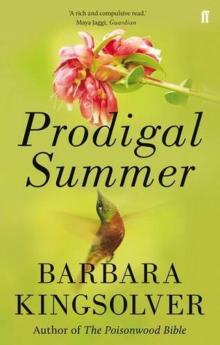 Prodigal Summer: A Novel
Prodigal Summer: A Novel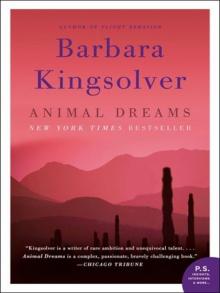 Animal Dreams: A Novel
Animal Dreams: A Novel The Poisonwood Bible
The Poisonwood Bible High Tide in Tucson
High Tide in Tucson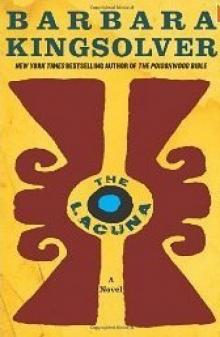 The Lacuna
The Lacuna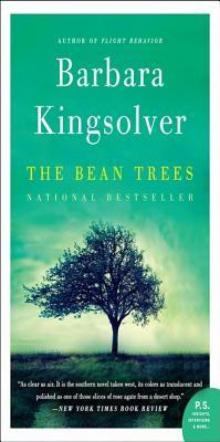 The Bean Trees
The Bean Trees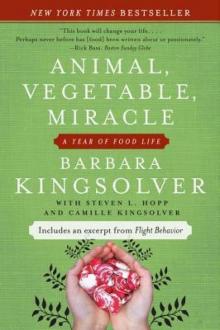 Animal, Vegetable, Miracle: A Year of Food Life
Animal, Vegetable, Miracle: A Year of Food Life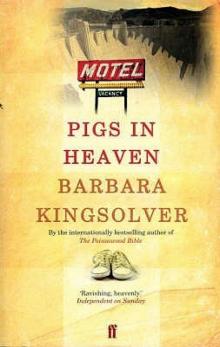 Pigs in Heaven
Pigs in Heaven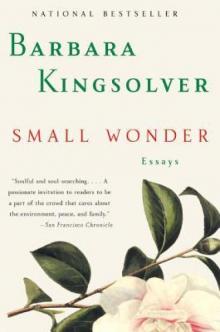 Small Wonder
Small Wonder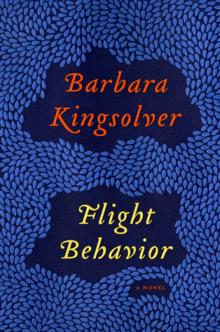 Flight Behavior
Flight Behavior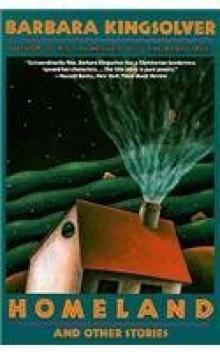 Homeland and Other Stories
Homeland and Other Stories How to Fly (In Ten Thousand Easy Lessons)
How to Fly (In Ten Thousand Easy Lessons) Unsheltered
Unsheltered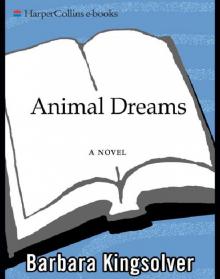 Animal Dreams
Animal Dreams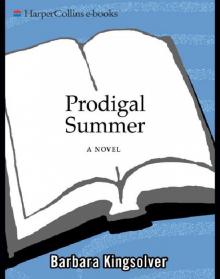 Prodigal Summer
Prodigal Summer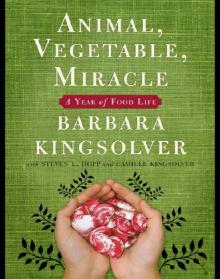 Animal, Vegetable, Miracle
Animal, Vegetable, Miracle